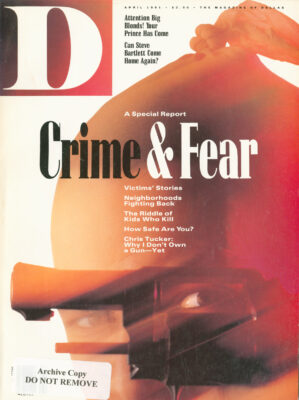She had been to a needleworking class, a particularly tedious one, where intricate stitches were practiced over and over, making her eyes tired. It was close to 11 p. m. when she finished up, and she still had to stop by the grocery store. As she drove out of the dark parking lot, she didn’t see the man following at some distance behind her car. She pulled into her driveway, weary, and gathered her packages. That’s when he struck her from behind with a blunt object, wrestled away her purse, hit her in the face, even ripped the wedding rings from her bleeding hand.
The victim of that crime is my neighbor. Her story is not particularly remarkable in the annals of Dallas’s mounting body of violent crime. But to her and her family- who couldn’t hear her screams-the attack was a life-altering event. And it changed all of us who live near her as well.
Most of you know a similar story. For the past year, Dallas has experienced an increase in violent crime that is numbing. Even my school-aged sons notice that details of violent crimes on the morning news are as predictable as our stuffing sandwiches into brown paper sacks.
Dallas is growing more deadly by the day. At this writing, there have been 75 homicides committed already in 1991. If predictions hold, this year’s tally will top last year’s record of 447 violent deaths.
While Dallas is certainly not alone, it is among the most dangerous of the nation’s large cities. Recently released ratings based on crimes reported to the FBI in 1989 put Dallas in the top five cities for homicide, rape, and aggravated assault. When the three were combined, Dallas won the dubious distinction of being the most dangerous city in America. Since 1989, things have only gotten worse.
What can we do-aside from wringing our hands or moving to San Diego? For one thing, we can accept the fact that we must take responsibility for our own protection. Even a diligent corps of cops led by the DPD’s promising new head, William Rathburn, can’t stem the tidal wave of violent crime without our help.
That message is beginning to sink in. Community groups, block associations, businesses, and apartment residents from Fair Park to Far North Dallas are taking matters into their own hands.
Their methods are as diverse as the scenery. In “War In The Streets, ” page 62, senior writer Rod Davis reports on a growing phenomenon in neighborhoods that are hardest hit by violent crime, the enclaves of the poor. Residents in southeast Oak Cliff, in Little Asia, and in Fair Park are Fighting back, mounting their own tough and sometimes armed resistance to the drug pushers and gangs and lawless street punks who invade their lives. In the more affluent areas of town, residents have the luxury of putting their money, not their lives, on the line. Our block banded together several years ago when a rash of break-ins, culminating in my neighbor’s driveway attack, led us to hire off-duty tactical squads to patrol on random nights. It worked.
Whether efforts such as ours and the scores of others around town merely displace crime, rather than deter it, is a matter of intense debate. So, too, are theories about the roots of crime and the ways of preventing it. It’s my hope that this package of stories on crime in Dallas will make each of us more aware of the city’s growing vulnerability. Criminal justice experts are in agreement that crime intervention must start at an early age. That means bringing kids in the impoverished inner city into the system rather than locking them out-giving them hope that they can work toward a meaningful life, that the decks are not stacked against them. That means renewed vigor in the fight to improve education, more funds channeled into preschool programs for low-income families, more effort toward lowering the dropout rate, more drug and alcohol treatment facilities in at-risk neighborhoods.
The challenges are enormous. But we can start by remembering that the problem is ours-not a mythical theirs. Police don’t fight crime, people do.
Get our weekly recap
Brings new meaning to the phrase Sunday Funday. No spam, ever.
Related Articles

Local News
In a Friday Shakeup, 97.1 The Freak Changes Formats and Fires Radio Legend Mike Rhyner
Two reports indicate the demise of The Freak and it's free-flow talk format, and one of its most legendary voices confirmed he had been fired Friday.

Local News
Habitat For Humanity’s New CEO Is a Big Reason Why the Bond Included Housing Dollars
Ashley Brundage is leaving her longtime post at United Way to try and build more houses in more places. Let's hear how she's thinking about her new job.
By Matt Goodman

Sports News
Greg Bibb Pulls Back the Curtain on Dallas Wings Relocation From Arlington to Dallas
The Wings are set to receive $19 million in incentives over the next 15 years; additionally, Bibb expects the team to earn at least $1.5 million in additional ticket revenue per season thanks to the relocation.
By Ben Swanger


